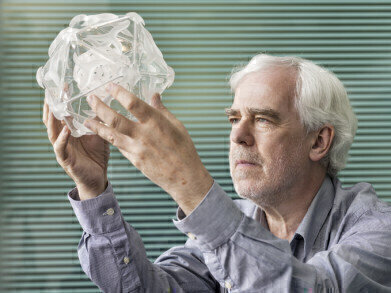-
 Dave Stuart with virus structure
Dave Stuart with virus structure
News
Join the Crowd and Make Science Leap Forward
Feb 15 2019
Diamond Light Source, the UK’s national synchrotron science facility has launched an international Citizen Science Project appealing for people of all ages worldwide to help speed up analysis of the terabytes of data that Diamond generates every day. The initial task set for citizen scientists is to spend a few minutes looking at a series of screens to identify viruses, with more tasks to be set for over the next three years. This will help train Artificial Intelligence systems (AI) and develop new ways of segmenting data, with the aim to automate the data segmentation processes. Unveiled at the American Association for the Advancement of Science in Washington DC, The Diamond ‘Science Scribbler – Virus Project’, is the first of its kind that members of the public can help with in such a big way. It is funded by the world’s biggest biomedical charity, the Wellcome Trust and being developed in collaboration with Zooniverse, the renowned citizen science web platform.
Professor Dave Stuart FRS, MRC Professor of Structural Biology at the University of Oxford and Life Sciences Director at Diamond Light Source explained: “The ultimate goal is to completely automate segmentation using advances in deep learning. Such methods require significant quantities of already segmented data to train the systems we use. To build segmented data for this development, Zooniverse will offer members of the public across the globe the chance to partake in segmenting datasets to help researchers. This project aims to address these issues by providing tools to help researchers label features of interest and to gather the data that is produced by citizen scientists in a standardised way that can be used to automate the process in the future, thereby helping fasten the analysis process from weeks to days or less.”
Diamond produces 500 terabytes of biological data a month, from high-resolution detailed atomic maps to low-resolution data, which makes the current methodologies of data segmentation challenging. Data is often low contrast and blurred and can be so large in size it becomes hugely labour-intensive to analyse.
Dave Stuart continued: “What we are doing now is to use cryo-electron tomography to visualise virus particles from the reovirus family in very thin slices cut from frozen infected cells. Our aim is, ultimately, to understand the full life cycle, how the virus gets into the cell, replicates, assembles and finally leaves the cell. In the tomograms here we have taken a snapshot 12 hours after infection and are aiming to visualise intermediate steps in the assembly process which have not been visible before, and to then work out how virus assembly is organised in time and space within the cell.”
Reoviruses belong to a large family of viruses that infect a wide range of animals and plants, some causing widespread disease, notably Rotaviruses, which is responsible for serious gastroenteritis across the globe. In contrast, reoviruses themselves, whilst they pervasively infect humans, they do not typically produce symptoms. Indeed, they are being trialled as possible anti-cancer agents, since they specifically replicate in many cancer cells activated for division. They are therefore a good starting point to try to understand the life-cycle of this family of viruses.
Mark Basham, Project Coordinator at Diamond Light Source, says: “We simply need as many people as possible to view images and locate what they recognise to be virus particles. This is based on real data and exciting work already underway at Diamond looking at the reovirus. This is screen time we can all advocate and we are not making too great a claim when we say it could benefit all of mankind in terms of accelerating scientists’ analysis of their research.
Prof Chris Lintott, Zooniverse PI at the University of Oxford, further adds; “You don’t need any specialised background, training, or expertise to participate in any of the Zooniverse projects. We make it easy for anyone interested to contribute to real academic research, on their own computer or through a mobile Application, at their own convenience. We hope, The Diamond ‘Science Scribbler - Virus Factory’ will entice you to become a regular volunteer.”
Check out the project at www.diamond.ac.uk
Digital Edition
Lab Asia Dec 2025
December 2025
Chromatography Articles- Cutting-edge sample preparation tools help laboratories to stay ahead of the curveMass Spectrometry & Spectroscopy Articles- Unlocking the complexity of metabolomics: Pushi...
View all digital editions
Events
Jan 21 2026 Tokyo, Japan
Jan 28 2026 Tokyo, Japan
Jan 29 2026 New Delhi, India
Feb 07 2026 Boston, MA, USA
Asia Pharma Expo/Asia Lab Expo
Feb 12 2026 Dhaka, Bangladesh


















